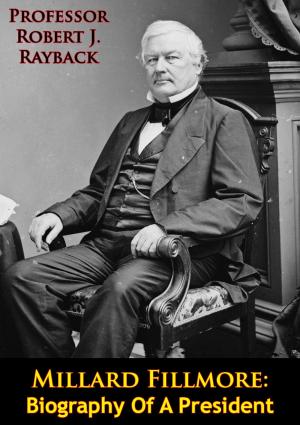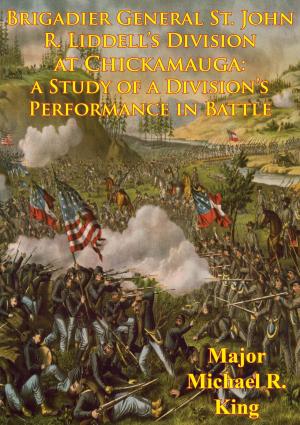Commander’s Intent Of Major General Joseph Hooker During The Chancellorsville Campaign
Nonfiction, History, Modern, 19th Century, Americas, United States, Civil War Period (1850-1877), Military| Author: | Major William M. Jurney USMC | ISBN: | 9781782899310 |
| Publisher: | Golden Springs Publishing | Publication: | November 6, 2015 |
| Imprint: | Golden Springs Publishing | Language: | English |
| Author: | Major William M. Jurney USMC |
| ISBN: | 9781782899310 |
| Publisher: | Golden Springs Publishing |
| Publication: | November 6, 2015 |
| Imprint: | Golden Springs Publishing |
| Language: | English |
Did “Fighting Joe” Hooker of the Army of the Potomac lose his nerve during the Chancellorsville Campaign of 1863? Perhaps history has failed to recognize Major General Joseph Hooker’s true commander’s intent for this campaign. Hooker’s intent was simple: maneuver forces to Lee’s flank and rear in order to force a withdrawal of Confederate troops from Fredericksburg. Hooker had no intention of engaging in a “risky confrontation” with General Robert E. Lee and the Army of Northern Virginia.
Hooker’s approach for planning his spring offensive would focus the Army of Potomac’s efforts toward outmaneuvering Lee’s Army of Northern Virginia. Hooker had put forth the idea of moving on Richmond and Lincoln advised him that his objective was Lee’s army and not Richmond. Hooker does pursue Lee’s army, as the main objective and not Richmond as the President had directed but the means that Hooker pursued to that end are misleading. Hooker entered what he considered the initial stage of his spring offensive at Chancellorsville thinking that he would first defeat Lee’s army by maneuver. Prior to Chancellorsville, however, Hooker was already making preparations for driving to Richmond.
Hooker had intended to confront Lee with the dilemma of being threatened from all sides. Unfortunately, Hooker had failed to communicate his intentions for his army’s movements of May 1, 1863 and confusion ran rampant among his subordinate commanders. Almost exclusively, Hooker developed the actual details of the plan himself. This flaw would result in numerous disconnects in Hooker’s plan.
Hooker’s plan would fail due to his own steadfast belief in the ability of his plan to force Lee to withdraw. To say that Lee defeated the Army of the Potomac is misleading because Lee did not defeat the army, he defeated Hooker as he fought a very effective defensive battle that removed the Federal threat from Virginia due to Hooker’s failings as an army commander.
Did “Fighting Joe” Hooker of the Army of the Potomac lose his nerve during the Chancellorsville Campaign of 1863? Perhaps history has failed to recognize Major General Joseph Hooker’s true commander’s intent for this campaign. Hooker’s intent was simple: maneuver forces to Lee’s flank and rear in order to force a withdrawal of Confederate troops from Fredericksburg. Hooker had no intention of engaging in a “risky confrontation” with General Robert E. Lee and the Army of Northern Virginia.
Hooker’s approach for planning his spring offensive would focus the Army of Potomac’s efforts toward outmaneuvering Lee’s Army of Northern Virginia. Hooker had put forth the idea of moving on Richmond and Lincoln advised him that his objective was Lee’s army and not Richmond. Hooker does pursue Lee’s army, as the main objective and not Richmond as the President had directed but the means that Hooker pursued to that end are misleading. Hooker entered what he considered the initial stage of his spring offensive at Chancellorsville thinking that he would first defeat Lee’s army by maneuver. Prior to Chancellorsville, however, Hooker was already making preparations for driving to Richmond.
Hooker had intended to confront Lee with the dilemma of being threatened from all sides. Unfortunately, Hooker had failed to communicate his intentions for his army’s movements of May 1, 1863 and confusion ran rampant among his subordinate commanders. Almost exclusively, Hooker developed the actual details of the plan himself. This flaw would result in numerous disconnects in Hooker’s plan.
Hooker’s plan would fail due to his own steadfast belief in the ability of his plan to force Lee to withdraw. To say that Lee defeated the Army of the Potomac is misleading because Lee did not defeat the army, he defeated Hooker as he fought a very effective defensive battle that removed the Federal threat from Virginia due to Hooker’s failings as an army commander.



![Cover of the book The Vicksburg Campaign, November 1862-July 1863 [Illustrated Edition] by Major William M. Jurney USMC](https://www.kuoky.com/images/2015/november/300x300/9781782899365-GJ69_300x.jpg)


![Cover of the book Dragoon Or Cavalryman, Major General John Buford In The American Civil War [Illustrated Edition] by Major William M. Jurney USMC](https://www.kuoky.com/images/2014/august/300x300/9781782895015-fa7T_300x.jpg)
![Cover of the book Colonel John Pelham: Lee's Boy Artillerist [Illustrated Edition] by Major William M. Jurney USMC](https://www.kuoky.com/images/2014/august/300x300/9781782898436-d99G_300x.jpg)
![Cover of the book Fredericksburg, 1862 : A Study of War [Illustrated Edition] by Major William M. Jurney USMC](https://www.kuoky.com/images/2012/may/300x300/9781908902610-4e8X_300x.jpg)


![Cover of the book At Gettysburg, Or, What A Girl Saw And Heard Of The Battle. A True Narrative. [Illustrated Edition] by Major William M. Jurney USMC](https://www.kuoky.com/images/2014/june/300x300/9781782892311-hgkP_300x.jpg)



